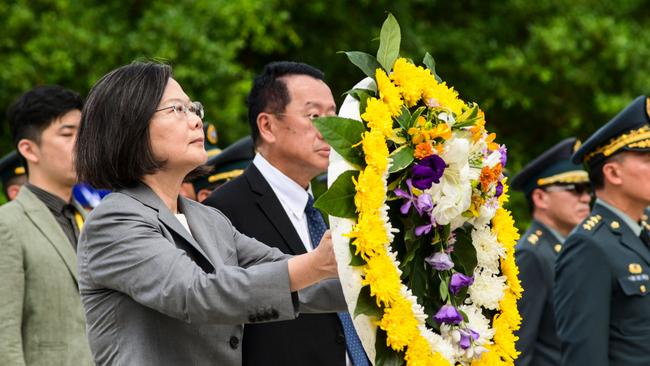Taiwan president requests jump in military spending to deter China
Tsai Ing-wen proposes second-largest defence budget increase in a decade.

One year after pushing through the biggest increase in Taiwan’s military budget in recent memory, the island democracy’s outgoing president ordered another substantial jump in defence spending this week as she tries to step up deterrence against China before leaving office.
As if to punctuate its significance, the unveiling of Tsai Ing-wen’s latest defence budget on Thursday coincided with an announcement by China of a fresh round of live-fire drills nearby. It also came hours after the U.S. State Department approved the sale of a new arms package to Taiwan.
Taiwan’s cabinet proposed a regular military budget of $US13.9 billion for next year, with an additional $US2.97 billion special budget to cover purchases of jet fighters and other weapons. The regular budget, if approved as expected by the legislature, would represent a 7.7 per cent increase from last year — the second-largest, year-to-year jump in the past decade, trailing only last year’s roughly 11.3 per cent increase.
Military spending in Taiwan was flat for years before Tsai took office in 2016, reflecting an era when the risk of conflict across the 160km Taiwan Strait separating the island from China was considered low. But tensions have steadily ratcheted up in recent years as Beijing intensified military activity in the strait, partly in response to warming ties between Taipei and Washington under Tsai.
China’s Communist Party, which never ruled Taiwan but claims it as part of China, has vowed to seize the island — by force if necessary.
Tsai pushed to nearly double Taiwan’s military budget during her time in office despite some public misgivings and scepticism about the likelihood of conflict. The war in Ukraine has helped her make her case, analysts said, by demonstrating that unprovoked invasion by an authoritarian neighbour is a real possibility.
“To maintain peace, we must make ourselves strong first,” Tsai said on Wednesday on the outlying island of Kinmen, at a ceremony marking the 65th anniversary of a battle there between Mao Zedong’s Communist forces and Chiang Kai-shek’s Nationalist troops.
The leap in spending reflects a “societal recognition that Taiwan needs to transform its military to deter aggression and defend itself,” said Drew Thompson, a former Pentagon official and currently a research fellow at the Lee Kuan Yew School of Public Policy at the National University of Singapore.
Even so, some military analysts said that Taiwan needs to spend even more given how China’s military dwarfs Taiwan’s forces. Earlier in March, China announced a defence budget of about $US224.79 billion for 2023, 16 times as large as Taiwan’s.
With the proposed increase, Taiwan’s baseline defence spending is set to account for slightly below 2 per cent of GDP in 2024, or 2.5 per cent including the special budget. That is well below the 3.5 per cent of GDP that the U.S. spent last year on its military, and less than others in the region.
Singapore, another island country whose military trains in Taiwan, spends 2.8 per cent of its GDP on defence. South Korea, which like Taiwan lives next to a threatening authoritarian neighbour, spends 2.7 per cent while also benefiting from a large U.S. military presence.
Just before the unveiling of Taiwan’s latest defence budget, the State Department said it had approved a $US500 million arms package that included infra-red tracking systems for F-16 jet fighters.
Taiwan’s Defence Ministry said Thursday that the package would enhance its jet fighters’ ability to track and detect long-range targets, calling it “a significant upgrade” of the island’s air combat capabilities. The Taiwanese air force currently has more than 100 F-16s and is expected to receive a few dozen more.
China’s military has helped drive up Taiwan’s defence costs by flying daily sorties in the airspace around the self-ruled island, prompting Taiwanese jets to scramble in response. Taiwanese media have reported that the air force has a large unpaid bill for jet fuel.
“Sometimes there can be discrepancies between actual needs and expectations,” Lt. Gen. Tsao Chin-pin, the air force’s chief of staff, said at a Tuesday press conference. He said the air force has NT$4 billion, or $US126 million, in outstanding deferred payments as of this month, and it is expected to settle by 2025.
Term limits will force Tsai to step down as president in January. As she nears the end of her tenure, she has grown more vocal about the risks of a China invasion and the need for Taiwan to prepare to defend itself rather than just hope others will come to the rescue.
“We must continue to implement defence reforms, push for defence self-reliance, and continuously enhance our military strength and resilience,” she told an audience of military leaders, war veterans, their families and descendants gathered at a luncheon on Kinmen on Wednesday.
Hours after Tsai concluded her events on Kinmen, China announced a new round of two-day, live-fire drills off the coast of Fujian province, facing Taiwan. The new drills, which started Thursday, follow a Chinese patrol exercise over the weekend that Beijing said was intended to express displeasure at a recent visit to the U.S. by Taiwan’s vice president Lai Ching-te, the current frontrunner to succeed Tsai.
The Wall Street Journal



To join the conversation, please log in. Don't have an account? Register
Join the conversation, you are commenting as Logout